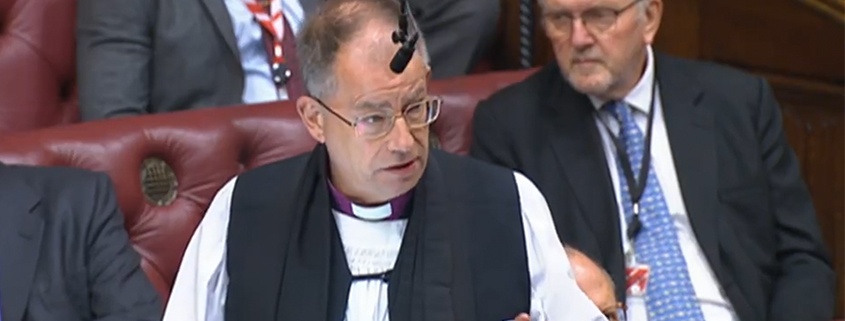Following the State Opening of Parliament on Tuesday 7 November, the House of Lords is debating the content of the King’s Speech over five days. The King’s Speech is written by the government. It sets out the government’s legislative agenda for the new parliamentary session. On Monday 13 November the Bishop of Oxford
It is a privilege as ever to take part in the debate on this most gracious speech. I thank the Minister for his clear introduction and also pay tribute to Lord Gascoigne and the Bishop of Norwich for their gracious and eloquent maiden speeches. It is particularly good to welcome the Lord Bishop of Norwich to this House with, as he has demonstrated, his considerable expertise on the environment and climate change.
My Lords I warmly welcome the Prime Minister’s ambition to build a better future for our children and grandchildren and deliver the change the country needs. But it seems to me, as to many, that so great are the challenges we face, that this and any government will need deeper humility combined with greater practical wisdom to lead the nation forward. I focus my remarks on my own two areas of focus in this House: the climate and artificial intelligence – both areas of existential risk in this and future decades.
On climate: I welcome the government’s restated determination to lead action on tackling climate change and diversity loss. As a member of your Lordships Select Committee on the Environment and Climate Change I do recognise the complexity of a fair transition for the whole of our economy to net zero. But I do not yet see this determination translated into effective leadership of granular policy, whether that is in the transition to electric vehicles or decarbonising home heating or encouraging behaviour change.
The tone of the speech is that the world is more or less succeeding in reducing greenhouse gas emissions. The opposite is of course the case. The years when we can avert future disasters are slipping away as Lord Stern has argued. I would say with respect to the noble Lord Lilley that much of the world is currently experiencing catastrophic effects of climate change as is well documented by the United Nations and others. We need greater leadership and co-ordination across every government department and an increased sense of urgency in this legislative programme.
And in particular I want to highlight the risks and dangers of politicising the climate change agenda which has been a feature of recent government announcements. Reaching net zero fairly demands the patient building of cross party and cross societal consensus which have been damaged by the recent changes on electric vehicle targets and by the decision to license yet more future oil and gas fields which are unlikely to come into production in time to support the essential and urgent transition we need.
Turning to Artificial Intelligence. I do want to congratulation the Prime Minister and the government on the recent AI Summit and all that has emerged from the discussions there. The Summit served to raise profile of the questions raised by AI and the ways in which the benefits of new technology can be realised and the mitigation of its potential harms. I welcome the promise of new legal frameworks for self driving vehicles, new competition rules for digital markets and the encouragement of innovation in machine learning.
However I do want to encourage the government to invest more deeply in dialogue with civil society about the impact of these new technologies. The recent summit claimed to involve civil society, but I have seen no evidence of this key third voice in the room. The government has entered into a rich dialogue between government and tech companies, which is welcome, but this dialogue must be informed by trade unions, academia, community groups and faith communities to build trust and confidence moving forward about the kind of society we are building.
So may I ask the minister in her response to indicate the ways in which the government will strengthen this third arm of the conversation in the coming months and years.



